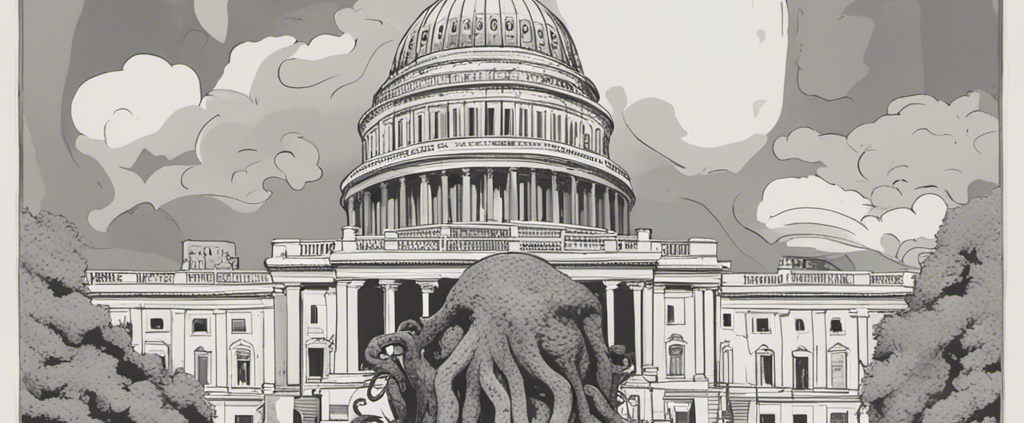Welcome to the Multiplex
Here’s What You Need To Know
If the rulebook for artificial intelligence (AI) is a movie franchise, get ready for more spin-offs than even a Marvel executive could dream up. That’s because policymakers around the globe each want to be their own superhero in the race to restrain what many believe is a runaway new technology. As a result, public affairs professionals across every industry sector find themselves standing before a multiplex of policy theaters, each screening its own version of the guardrails needed for AI.
Today, we are launching DelveInto.AI, a new offering specifically designed for those who need more than a seat in the AI regulatory debate theater, but a role in writing the screenplay. In the race to develop and utilize AI, firms and investors must be keyed in to the emerging policy landscape, and Delve’s new offering will help them and the public affairs advisors they rely on to do just that, because waiting until this movie is streaming will cause a lot more than FOMO. Here’s what you need to know to secure your AI information advantage.
“Techlash” = Payback
Policymakers Regret “Mistakes Of The Past.” Policymakers took a hands-off approach to regulation of the internet in the 1990s and the spread of mobile apps and social media platforms in the 2010s. After many years of allowing industry to “move fast and break things,” policymakers and many in the public want to avoid what Sen. Richard Blumenthal (D-CT) called “the mistakes of the past.” From concerns about the impact of social media on children to content moderation to what some claim are anticompetitive practices in Big Tech, policymakers and their constituents are nursing wounds from their ongoing tussles with Big Tech. This “techlash” could fuel a hasty policymaking process that decommissions AI innovators before their products see the light of day.
Subscribe to Receive Insights
"*" indicates required fields
The Curtain Is Rising on AI Regulation Across the U.S.
No State of Waiting. On one screen in the multiplex of AI policy theaters are state-level policymakers who show no interest in waiting for Washington to act. Years of experience bringing Big Tech to court and pushing through laws on issues like data privacy have battle-hardened state officials for this moment. States like Colorado, Connecticut, and Illinois have already passed legislation to address AI issues such as algorithmic discrimination. Other states, including California, Massachusetts, and Rhode Island have seen bills introduced that would broadly regulate generative AI. Expect this early trickle of bills to turn into a tidal wave in next year’s legislative sessions with policymakers, stakeholders, and industry scrambling to add their own voice to the debate.
In Delve’s U.S. Nationwide Risk Assessment, we identified eight key factors driving which states are likely to advance AI policies in the coming year, and what issues are top of mind for state policymakers to address.
Washington’s Whole Of Government Approach. Another screening of AI rules is happening at the federal level, where policymakers at both ends of Pennsylvania Avenue are crafting regulations and coordinating closely with big industry players to set standards that are shaping the terms of the debate. The Biden Administration is bringing to bear on AI the same aggressive, whole-of-government approach it has taken to tackle climate, crypto, and other hot button issues. As a result, numerous federal agencies are enforcing restrictions on the use of AI under their existing authority and are taking additional rulemaking action based on Biden’s forthcoming executive orders. This summer, Biden scored voluntary commitments from leading AI companies to self-regulate, which the Federal Trade Commission (FTC) plans to enforce. This past week, Senate Majority Leader Chuck Schumer (D-NY) hosted a who’s who of AI executives and labor and civil rights advocates in the first of a series of Capitol Hill briefings to help lawmakers craft an AI policy framework. If founders and funders of AI projects haven’t yet found a seat at the table in Washington, they’ll be left out in the cold or, worse, on the menu.
Delve’s U.S. Federal Risk Assessment highlights who the key policymakers are and what issues are shaping the debate inside the Beltway.
Global Forces Are Also at Play
Beware the Brussels Effect. The rush to regulate AI isn’t only an American phenomenon, but a global one. The European Union has raced ahead with its nearly complete AI Act, which would ban certain uses of AI and mandate that companies producing high-risk AI tools comply with a range of safety requirements. The EU has a history of winning the first-mover award on major policy reforms, leading to what some call the Brussels effect. By setting the most stringent rules on data privacy in 2018 under the General Data Protection Regulation and more recently content moderation under the Digital Services Act, industry players may face increasing pressure to re-orient their entire global offering to comply with Europe’s demands.
Neither London nor Beijing are keen to let Brussels steal the show. China has new rules that include requiring generative AI providers to register with the government and ensure their systems “adhere to core values of socialism” and London is looking to coordinate global policy as well, with plans to “host the first major global summit on AI safety” later this year. The decisions made today by international players and policymakers will ripple across borders and influence the future of AI innovation, meaning firms with international aspirations must pay careful attention and ensure they can build and leverage the right relationships to shape the debate.
Delve’s Transatlantic Risk Package helps you understand the action at home and abroad, diving into the actions in Brussels, London, and other key European capitals.
Traditional Policymakers Aren’t The Only Actors In the AI Regulatory Theater
Policy Discussions Don’t Happen In A Vacuum. Outside the formal processes, a diverse range of stakeholders are shaping public and policymaker perceptions. There are those who want to stop or at least pause AI development, plus activists concerned about issues like algorithmic discrimination, intellectual property, or other issues. Then there are industry leaders and investors who want AI innovation to continue, though nothing suggests the interests of the major industry players, which already have a seat at the policymaking table in many capitals, will align with the interests of everyone else building or using AI tech.
DelveInto.AI Will Keep You Ahead of the Debate. The AI policy landscape is shaping up to be one of the most complicated and complex in recent memory. Just like the technology itself, the debate is moving faster every day, making it impossible to stay ahead without the right tools in place. That’s where DelveInto.ai gives your public affairs operation an advantage.
In addition to Risk Assessments providing in-depth analysis of the policy landscape in key jurisdictions, our team of analysts is tracking policy and stakeholder activity on a daily basis. This tracking will be available to DelveInto.ai subscribers in the coming weeks, and those who purchase one or more risk assessments will receive a free trial to the tracking service.
If You Don’t Shape The AI Debate, It Will Shape Your Interests. It’s quickly becoming an adage that AI won’t replace you, but someone using AI will. Likewise, you may not be focused on the AI policy debate, but those who are focused on the debate will shape it, and how those rules are written will determine AI rules of the road for every industry sector. To ensure you can focus on this fast-moving debate smartly, you will need DelveInto.AI.



